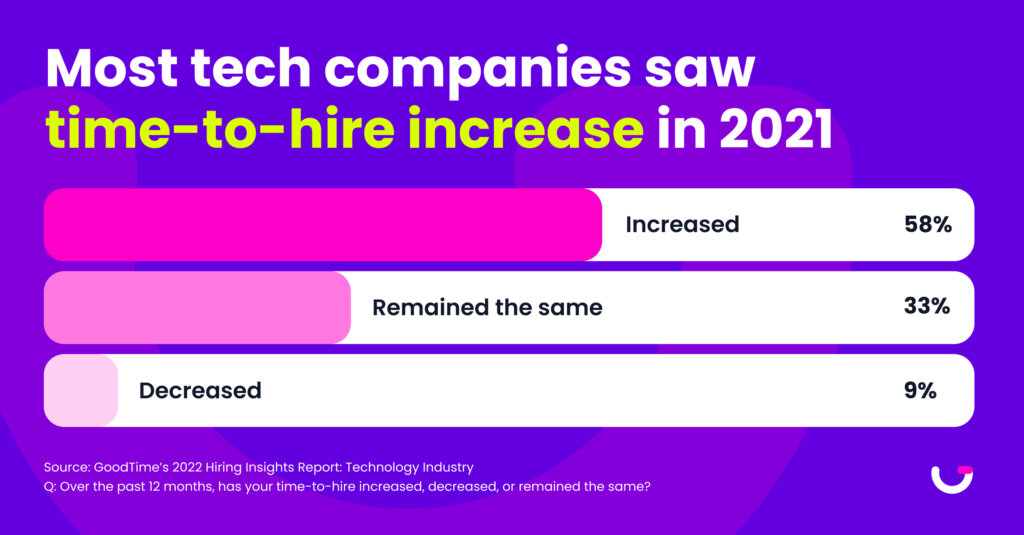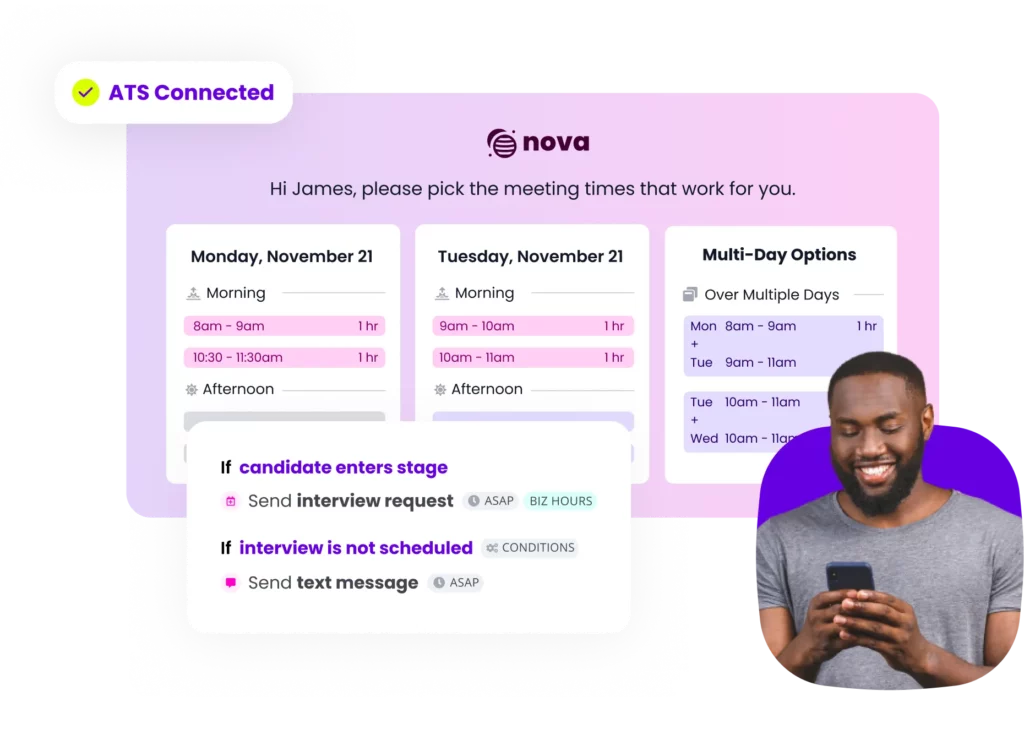In the war for talent, no tech recruiting team wants to be left in the dust. Decreasing your time-to-hire is a reliable way to outpace the competition. Yet based on the data from our 2022 Hiring Insights Report: Technology Industry, few recruiters in tech have seen their time-to-hire decline.
If alarms aren’t going off in your head, they should be. A long, inefficient hiring process is a candidate-repellant (and recruiting tech talent is already hard enough).
Recruiters in tech should take proactive steps to decrease their time-to-hire—and we’re here to help them do that.

Unlock tech’s top hiring strategies in 2025
Our study of 100 tech TA leaders reveals how to hit your hiring goals in a challenging market.

What is Time-to-Hire?
First, let’s get back to the basics. Average time-to-hire refers to the time that passes from when a candidate submits their application to when the candidate accepts a job offer.
Note: this isn’t the same as time-to-fill, but they’re often confused with each other. The interval for time-to-fill begins before time-to-hire; it measures the time from when a job requisition is posted to when a candidate accepts an offer.
What’s a “good” time-to-hire for a tech company recruiter? It’s hard to say. Average time-to-hire ebbs and flows with economic and market conditions, the seasons, and requisition loads.
Even company size matters. The average time-to-hire for smaller tech companies is 29 days, while larger tech companies see an average of 43 days. Smaller tech companies tend to have fewer hoops to jump through to bring on new hires, which decreases time-to-hire.
The State of Tech Recruiting’s Time-to-Hire
How did tech companies stack up in 2021? We conducted our 2022 Hiring Insights Report: Technology Industry to find out. After surveying 409 talent leaders across the tech industry in the U.S., we saw that the industry’s time-to-hire isn’t a pretty picture.

The majority of talent teams in tech—58%—said that their time-to-hire increased. Only 9% saw it decrease.
But not everything from our survey is doom and gloom. Talent leaders said that improving hiring efficiency is currently their biggest focus area for the future (41%). With the current condition of their time-to-hire, hiring efficiency needs all of the focus that it can get.
Why Does This Matter?
There are innumerable benefits to keeping a firm pulse on your time-to-hire and taking active steps to decrease it. Here are a few reasons why time-to-hire matters:
- Slow processes kill a candidate’s interest. A short time-to-hire keeps candidates engaged.
- Hiring fast increases the chance that you’ll win the most qualified candidates before your competition.
- Time-to-hire illuminates the bottlenecks in your hiring process, and your holistic ability to compete in the market.
- Agile recruiting provides candidates with a smooth hiring experience and boosts your employer brand.
- Lengthy hiring processes that leave positions unfilled negatively impact company revenue.
The tech industry’s increasing time-to-hire is concerning. Even as hiring slowdowns and fears of a tech recession ricochet across the industry, time-to-hire is still a critical KPI.
Regardless of hiring volume, hiring with speed is of utmost importance. If your company is hiring at its normal volume, you’ll face the challenge of finding and winning enough qualified candidates. If your company is hiring to a lesser degree, you’ll need to hire fewer but higher quality people.
No matter what group you reside in, establishing an efficient hiring process to decrease your time-to-hire is the key to securing the best talent.
How to Fix Tech’s Time-to-Hire Problem
From implementing automation to keeping candidates engaged, recruiters in tech must institute the right processes to get talent in the door faster while still delivering the high-quality hiring experience that candidates expect.
1. Let Your Hiring Data Be Your Guide
There’s always something to learn from your data, especially when identifying and resolving efficiency gaps. Use the data on your hiring process to diagnose what’s helping and hurting your time-to-hire. Then, you can make adjustments accordingly.
For example, what does your response rate look like? Are candidates more receptive to correspondence via email or text? And what about your time between stages? Are you keeping your talented candidates waiting days and days before moving them on to the next interview?
2. Get Real With Your Hiring Manager
We’ve said it once, and we’ll say it again: the “perfect candidate” doesn’t exist. Your picky hiring manager with a laundry list of requirements, searching for their purple unicorn candidate, is in for a rude awakening once their role sits open for months.
The importance of creating alignment between hiring managers and recruiters in tech early on cannot be overstated. Hold an intake meeting to discuss what a realistic ideal candidate looks like, and what touchpoints are necessary to hire this person.
Here are several other topics to cover in your intake meetings:
- Ideal candidate profile
- Hiring process objectives
- Job requirements
- Title & salary
- Hiring process stages
- Sourcing strategies
When done correctly, the alignment from intake meetings ensures that the hiring process moves along at a steady pace and onboards the right person in a timely manner.
3. Say Goodbye to Manual Interview Scheduling
No matter the industry or company, all recruiting coordinators know the pain of sifting through calendars to find the perfect interview time. Manual scheduling invites hiring delays and bottlenecks—and nobody wants that.
And what about when one of your interviewers cancels last minute? (Because yes, you know it’s going to happen.) Then suddenly you’re back to square one, up to your eyeballs in calendars, looking for an alternate interviewer with a free afternoon to speak to your candidate.
Automation is the solution to your interview scheduling headaches. By leveraging the right tech to automate your scheduling process, you’ll get a meeting on the books within seconds. Don’t believe us? Check out the difference that automation made for HubSpot’s talent team.
AI for more human hiring
Interview scheduling is just the start. Use human-centric AI to elevate your hiring experience while automating 90% of interview scheduling tasks — for any role, in any place, at any scale.

4. Capture Your Candidate’s Attention
If you struggle to get talent to say “yes” to offers, or if candidates drop out left and right, then you have a candidate engagement problem—and this means bad news for your time-to-hire.
Every touchpoint in your hiring process should engage candidates and nurture your candidate relationships. If candidates don’t feel connected to your talent team, your company will quickly fade into the background amid competing opportunities (that’s right, your candidates are most certainly shopping around).
The secret sauce to cultivating impactful candidate relationships consists of four pillars:
- Genuine Connection: Candidates want to have meaningful conversations about your company’s mission, culture, and DEIB beliefs. They want to uncover if they align with what your company stands for.
- Transparency: Candidates expect a transparent hiring process. Candidates want open communication from employers. Most recently, at the top of their wish list is pay transparency.
- Adaptability: Your hiring process must adapt to the calendars of your candidates. They want to schedule interviews at times that best fit their everyday lives.
- Candidate Well-being: Candidates want to understand how your company proactively supports employee mental health, and learn about any related benefits that are offered.
Hey Recruiters in Tech: Want Future-Proof Solutions to Your Challenges?
Don’t let a skyrocketing time-to-hire bring your hiring process down. To keep your time-to-hire in check, get into the habit of identifying bottlenecks and optimizing your process for speed and efficiency.
And for more tips, check out what our experts had to say about how they’re solving today’s tech hiring challenges.




